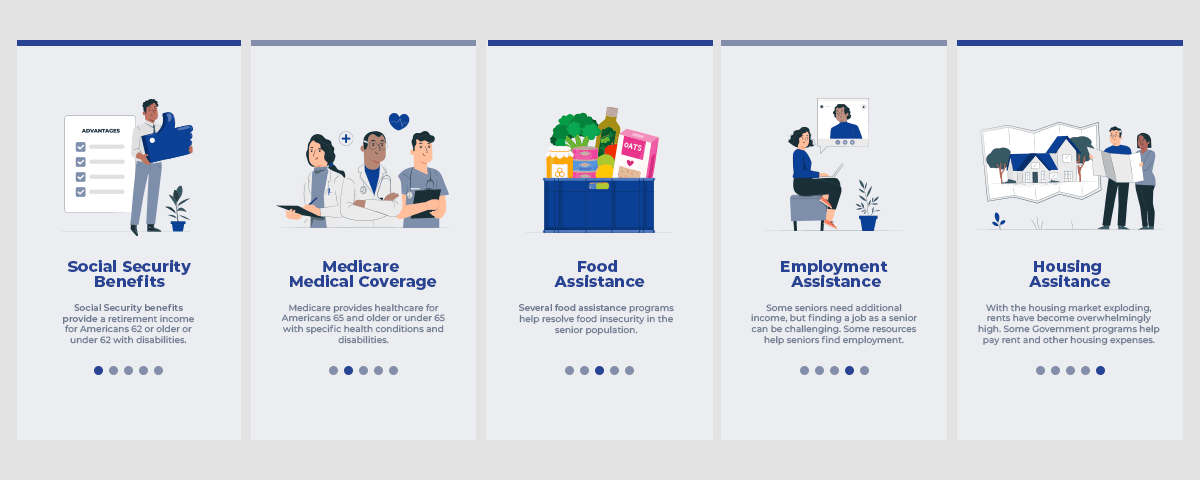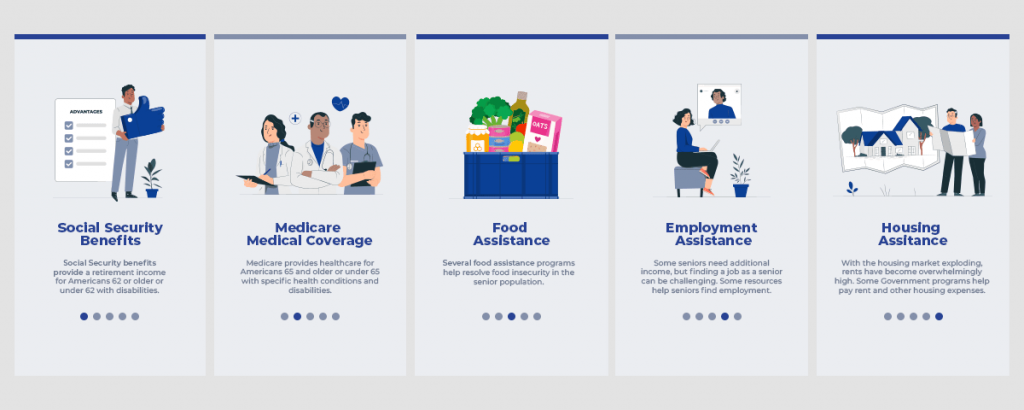
Many seniors know that living on a fixed income isn’t always easy—especially when the price of virtually everything is rising daily. Whether you find yourself in a position where you need extra help or care for a loved one who needs help, knows there’s help for seniors. We’ll look below at the top 5 government benefits for seniors.
Government programs for Seniors over 65
Life can be stressful and expensive, especially when in your golden years. Thankfully, various assistance programs may help you if you are in need. Federal Government benefits for seniors can help with food, employment, monthly income, and even housing.
The top 5 government benefits for seniors include:
- Social Security Benefits
- Medicare Medical Coverage
- Food Assistance
- Employment Assistance
- Housing Assitance
Social Security benefits for seniors
Social Security benefits are designed for older adults 65 and up. Average monthly benefits are around $1,614 for older Americans. Most retirees receive Social Security.
And for seniors who rely solely on Social Security benefits, SSI (Supplemental Security Income) can help to provide additional monthly income. The average SSI monthly in 2022 is around $841 for a single adult and about $1,261 per couple.
Medicare medical coverage
Nearly 59 million citizens receive medical care through Medicare. Healthcare expenses can be sky-high, especially for seniors.
With an already strained budget, it can be overwhelming for many to pay for doctors’ appointments, prescriptions, emergencies, and hospital stays. Medicare is an excellent source of health insurance for senior citizens in the United States and is one of the oldest federal programs.
Medicare helps cover bills that result from hospitalizations (Medicare Part A), doctor visits (Part B), and prescription costs (Part D). Although Medicare can help seniors save lots of money, it’s not entirely free.
Medicare covers 80% of your medical expenses, and you’ll be responsible for the remaining 20%, deductibles, and copays.
Should you find yourself needing extra assistance with the cost of your prescriptions, know that there are prescription drug savings cards that can ultimately help discount your out-of-pocket drug costs.
Additional senior medical assistance programs
In addition to Medicare, seniors may look into several other programs that can be of assistance.
Medicaid is available for those who meet the qualifications based on income. Medicaid services can cover both outpatient and inpatient services and can help cover Medicare deductibles and premium costs.
The PACE (Program of All-Inclusive Care for the Elderly) program is another useful program that can assist seniors with additional care. Dental care, home health care, X-rays, nursing homes, and meals are just some services that this program can help cover.
The Dental Lifeline Network is beneficial in assisting qualified patients in receiving adequate dental care. Medicare tends only to offer minimal dental care, and many seniors may find that all-inclusive Medicare plans such as Advantage plans or Medigap plans may not fit their budgets.
The SHIP (Senior Health Insurance Assistance Program) program helps with medical bills and insurance coverage benefits. It will even provide seniors with financial assistance through vouchers for prescription medications. The group of volunteers at SHIP will even help Medicare beneficiaries with insurance appeals and denials.
Similarly, Health Insurance Counseling has counselors specializing in health insurance and can help explain anything and everything about Medicare. The experienced counselors will even help answer medical questions about long-term care coverage.
Transportation may not always be easy to obtain. Thankfully, seniors can receive transportation to and from doctors’ appointments through various organizations. Churches, senior care centers, and other charities may help provide these services. Extra help is a federal program that offers savings and discounts on prescription medications.
Both private organizations and government agencies can help provide seniors with DME (Durable Medical Equipment). DME can include wheelchairs, walkers, lift chairs, and more. Seniors in need can receive this equipment at a discounted rate and may even be able to loan this equipment at no cost.
A Medicaid Waiver can help seniors who require long-term care stay within a community rather than moving to a long-term care facility. The Senior Medicare Hotline is an excellent resource for seniors needing help paying their medical expenses. In addition to helping educate seniors, the nonprofit organization also offers grants for medical bills.
Food assistance for seniors
Groceries are necessary; for many seniors, the grocery budget gets stretched thin when the cost of goods increases and fixed incomes remain the same. Several government benefits for seniors programs help seniors with the cost of food, whether through direct donations or a program that provides funds to seniors to grocery shop.
SNAP (The Supplemental Nutrition Assistance Program) is a government food program that provides seniors with qualifying low incomes monthly deposits on an EBT (Electronic Benefits Card) card, specifically for groceries. Food Stamps is another name for the SNAP program.
Qualifying recipients’ monthly gross income must equal or be less than 130% of the poverty level. So, individual households would have to make $1,396 or less per month, and couples will have to show an income of $1,888 or less per month in 2022.
Both federal and state governments offer nutrition programs designed to help educate seniors in nutrition and meal planning. For example, the Congregate Meal Site Program provides help at various senior housing centers and churches. The program provides hot meals and educational workshops.
The SFMNP (Seniors Farmers Market Nutrition Program) is also an excellent resource for seniors. The program offers low-income seniors booklets packed with coupons at various farmers’ markets. It’s important to know that these coupons are solely for fresh produce, not dried and canned foods.
Seniors can also utilize the TEFAP (The Emergency Food Assistance Program) program. The donated foods include meats, dairy, produce, and canned food items. The program is run through the state, and most who qualify for SNAP will also qualify for TEFAP.
Another food assistance program available for those needing extra help is the CSFP (Commodity Supplemental Food Program). Hot and healthy meals and groceries are provided to seniors with low incomes.
Meals on Wheels is a fantastic program for seniors who are homebound. Volunteers work to deliver meals and groceries while also providing good company for seniors who can’t leave their homes.
In addition to meals for seniors, the program provides pet food for those with cats or dogs. Even the holidays are considered with this program, as volunteers work through the holidays to deliver yummy holiday meals.
Employment assistance for seniors
For those with stretched incomes, finding employment can provide additional monthly payments to help with expenses. Many even find that work helps alleviate boredom and loneliness, two things many seniors may experience in their golden years. The SCSEP (Senior Community Service Employment Program) program employs those 55 and up with community or government agencies. Some of the available jobs include technician and assistant teaching positions.
The program provides in-depth training for different opportunities, which gives seniors an excellent chance to succeed. The program will assess former work experience, and can receive a free physical exam to evaluate physical capabilities for job training. Generally, seniors are offered part-time employment to begin with, but it may develop into full-time positions if seniors succeed.
Housing assistance for seniors
Housing costs are skyrocketing. Not only is the cost to rent or purchase prohibitive, but the cost to heat and cool your home is also. The HUD (The Housing and Urban Development) program helps to provide rental assistance vouchers to those in need. In addition to rental assistance, the program can help provide transportation, meals, and cleaning services to qualifying recipients.
The Congregate Housing Services program provides support and subsidies through the state for qualifying seniors. The income must be moderate or below, and the need to reside in senior housing. Recipients of this program are typically much older or have severe health issues and can receive house cleaning and meals.
Lifeline is a program that helps cover the cost of phone services for low-income seniors. If you’re a recipient of SNAP or Medicaid, you automatically will qualify for Lifeline phone services. The LIHEAP (Low Income Home Energy Assistance Program) program helps pay for qualifying seniors cooling and heating power bills.
The US Department of Energy’s Weatherization Assistance Program also helps seniors with energy-related maintenance and repairs. They can help install insulation, replace or repair water heaters and AC units, and can replace thermostats. Qualifying seniors are those over 60 with a disability.
FAQs
How old do you have to be to qualify for Medicare?
Medicare is for Americans aged 65 and older and those under 65 with specific health conditions and disabilities. Low-income individuals that don’t yet meet the eligibility requirements for Medicare enrollment can apply for Medicaid.
What if I can’t afford my Medicare Premiums?
There are several Medicare Savings Programs for low-income Medicare beneficiaries. These programs can help cover the Medicare costs such as premiums, deductibles, copayments, and coinsurance. Contact your local SHIP office if you don’t qualify for an MSP. They have additional resources that may be able to assist those with limited income.
What can I do if the food assistance isn’t enough?
You could look into a Medicare Advantage plan if you’re on Medicare. These supplemental Medicare plans will sometimes include additional benefits such as an allowance for healthy foods. You could also reach out to the following programs for assistance.
- Commodity Supplemental Food Program
- Seniors Farmers Market Nutrition Program
- Meals on Wheels
How do I apply for Medicare?
You can apply for Medicare through the Social Security Administration by going online, can call them to schedule an in-person appointment, or you complete the application over the phone.
Getting help with Medicare costs
Life is expensive, and unexpected costs can throw a monkey wrench in an already tight budget. Don’t let your healthcare expenses zap your budget even more. Call our experienced Medicare experts today, or fill out our online quote form. Our dedicated team will find the best Supplement plan for you and your budget so you can sleep soundly at night.
Related Content
